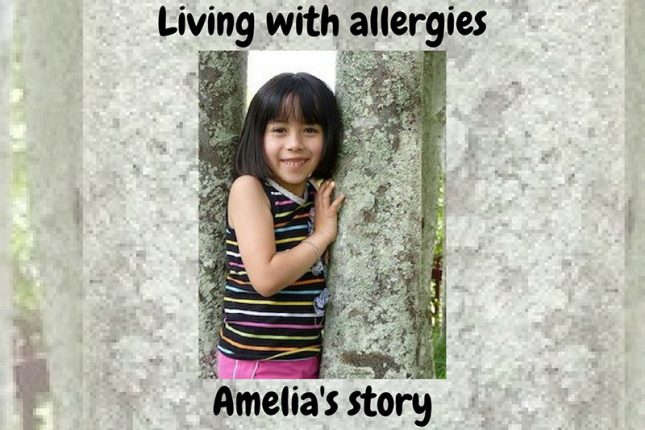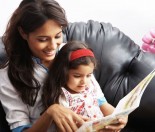It’s Allergy Awareness Week soon and we talk to a family where allergies are part of everyday life. Kiwi mum, Amanda, talks about living with allergies for 6 year old Amelia.
Living with allergies: Amelia’s story
KF: Tell us a little bit about your family and how you are affected by allergies.
Amanda: We’re Nick and Amanda; Sophie (10), Amelia (6) and Lucy (3).
Amelia had eczema right from when she was born. We weren’t really sure at the time what it was and nobody gave us a conclusive answer for quite a long time. She was often unwell as a baby with colds which usually required antibiotics to clear up and her skin was always raw. She had a lot of ear infections and had her first set of grommets when she was less than a year old.
When she began eating solids as a baby, I would occasionally give her some Nutella on bread which Sophie (then 4) loved. Each time she ate it, Amelia would get a little rash around her mouth – looking back they were more like hives. At the time I suspected she was perhaps sensitive to gluten or wheat and stopped giving her bread – I had heard a lot about allergies to peanuts, but not to other nuts and never suspected that she was reacting to the hazelnuts in the Nutella.
One evening when Amelia was just over a year old she took the crusts from her sister’s Nutella toast and had only began to rub it on her lips when blisters started to appear and as I watched her whole face began to swell and droop as though melting. It was horrific and scary – I threw her and Sophie in the car and began the 35 minute trip to the hospital. An ambulance met us halfway and carried her, still strapped into her car seat, into the back and screamed off before us down the road. We met her there and spent most of the night in hospital. This was the beginning of a whole new way of life for all of us.
She developed asthma later that year and because she attended day-care and we lived rurally (ie. not close to a hospital), she took an auto-injector everywhere she went. We were told that there was a good chance she would grow out of her allergies before the age of 5 but she hasn’t and in fact has developed new allergies as well.
Amelia now has allergies to peanuts, tree nuts, house dust mites, penicillin and erythromycin. Her food allergies are particularly stressful because a reaction is instant and life-threatening. When she was little it was relatively easy for us to monitor and control her food and her environment. As she grows older this is becoming increasingly difficult – she needs to take a greater role in keeping herself safe.
Her allergy to house dust mites is not immediately life-threatening but constantly undermines her quality of life and she has required surgery on her ears, nose and throat annually since she was born to relieve the pressure of her swelling airways. She has missed a lot of school due to illness, fatigue and specialist appointments. Financially this all takes a toll as well – she needs to carry two auto-injectors at all times. These cost around $120 each, are not government funded or subsidised, and need to be replaced each year.
KF: What does this mean for you and your daughter on a day-to-day basis?
Amanda: Amelia is a happy six year old who enjoys school and has lots of friends. However, she is different to other kids and this is evident everywhere she goes – there are copies of her medical action plan with her photo attached all over school. She carries a medical bag and wears a medic alert bracelet. Other kids can’t eat nuts around her and she always has to ask what is in her food. When she goes for a play-date, we must teach her friend’s parents how to use an auto-injector before we leave her. It’s not fun, we wish we didn’t have to do this. It isn’t over-reacting. This is just what we have to do to keep her safe.
KF: What things have you found help your daughter and her allergies?
Amanda: When Amelia was a baby, we were fortunate to have a chance meeting with Pauline Brown, a wonderful eczema specialist nurse at Whangarei Hospital, during a Christmas party. Pauline examined Amelia on the spot and wrote us out a care plan for her eczema. I talked to our GP who made a referral for Amelia to see Pauline, who has been our main source of allergy information and advice for the past six years. Consulting with professionals who have experience and interest in allergies and following their advice has been our main tactic.
We’ve made some lifestyle changes – we don’t have nuts in the house. We don’t have a cat. In her bedroom Amelia has wooden floor, new gib wall linings and dust-mite protective mattress and pillow coverings. Last year she was the recipient of a new air purifier, which was donated by Chilltech, through a local newspaper. We bought a fancy allergy vacuum cleaner and a steam mop.
Amelia takes her medications every day, which include anti-histamine, nasal spray, tablets and an asthma preventer. She avoids potentially dangerous foods and situations. Her sister and her friends look out for her.
Her surgeries have helped too, but none of these things have made a huge difference on their own. It has been a combination of factors, interventions and resources which altogether have made things better over a long period of time. She is currently the healthiest she has ever been and is attending school full-time for the first time, but is reliant on a number of different medications, people and resources to do so.
Earlier this year Amelia began Immunotherapy – a sub-lingual medication she takes every day for a minimum of 3 years which aims to gradually increase her resistance to an allergen – in Amelia’s case, house dust mites. This is quite an undertaking – as well as the 3 year commitment this is not government funded either and costs around $100 per month.
KF: Can you suggest places that people can go for help or support if they have children with allergies?
Amanda:
- Allergy NZ
- Parent 2 Parent
- Star Allergy Alerts is for young children in particular – lunchbox stickers and badges with allergy warnings can be a life-saver. Also auto-injector cases etc.
- Asthma Foundation
- GP
- Yellow Cross is a UK-based website selling high-quality medical bags, cases and wallets etc for carrying auto-injectors, inhalers and other medications.
KF: Do you have any advice for families whose children have been diagnosed with allergies?
Amanda:
- Find a GP who has experience or an interest in allergies, or who at least takes your concerns about allergies seriously.
- Research where your nearest allergy specialist is and ask for a referral to see them.
- Talk to your children and his or her siblings about allergy. Answer their questions honestly but gently.
- Be prepared. Have an action plan made up and keep your emergency medicines close. Make sure everyone in your family knows the plan. Then feel confident that if your child has a reaction everyone will know what to do.
- Give copies of the plan to your child’s school or preschool centre and talk to staff about how and when this should be enacted. There are also some really good posters, DVDs and books available for use in schools to teach children about food allergies. Training is available for teachers too, which includes using auto-injectors. The latest Food Allergy Guidelines for Schools are available from Allergy NZ.
- It is impossible to avoid food and this allergy may be something your child has to deal with for the rest of his/her life. Avoid causing your child to be afraid of food, or of social situations. It comes down to careful management and good communication, not about eliminating risk altogether.
- Teach your child to identify potentially unsafe foods. Teach them to ask the right questions, of the most appropriate person available. Reassure them that if something does go wrong, everybody knows how to respond and help is close at hand.
- Remember that your other children will also be affected. They may miss out on their favourite foods, which now must be avoided. They worry about your allergic child too and what the future holds. They sometimes feel second-best when all the attention is on your allergic child.
For more expert advice, check out our Health and Wellbeing: Allergies section.








amazing story Mandy about our wee precious Milly J, unfortunately it took me ages to read as I was sobbing through it. You guys are brave an awesome and inspirational for how you cope with this as a family.